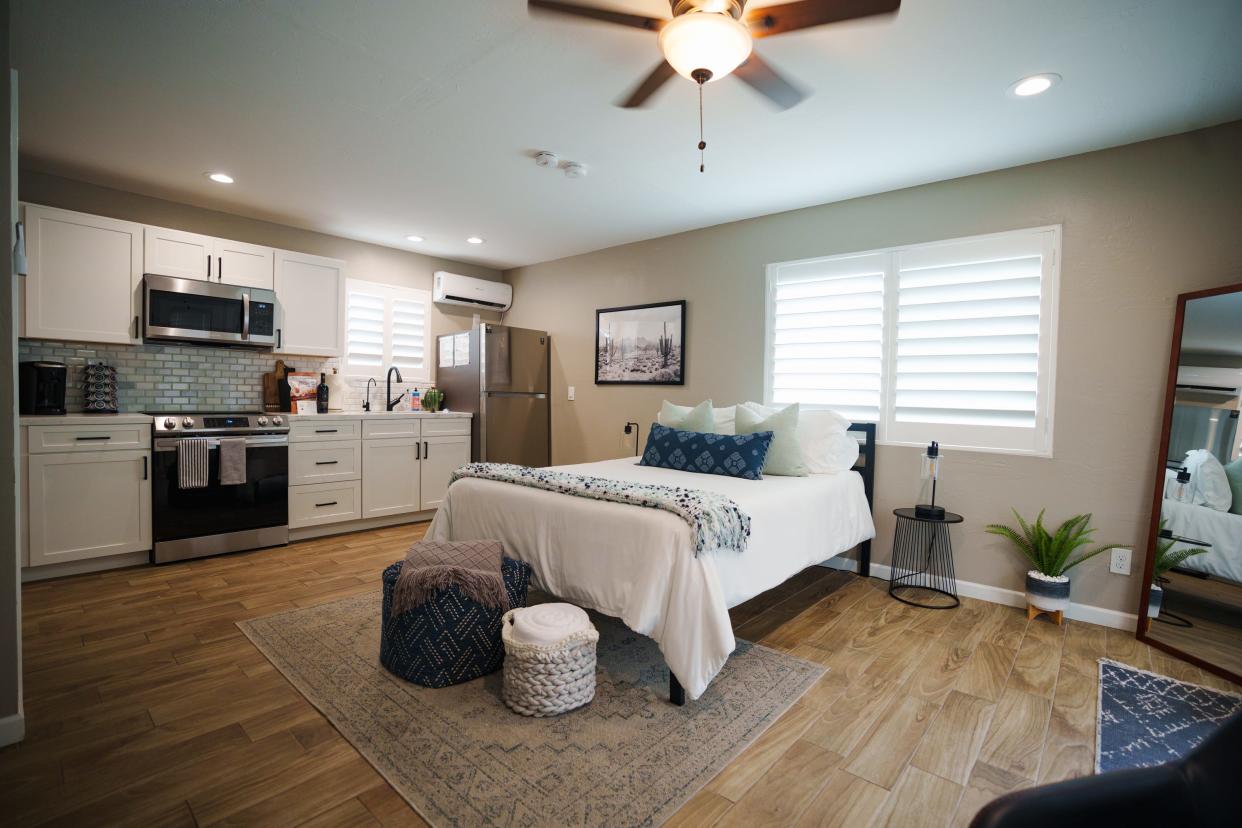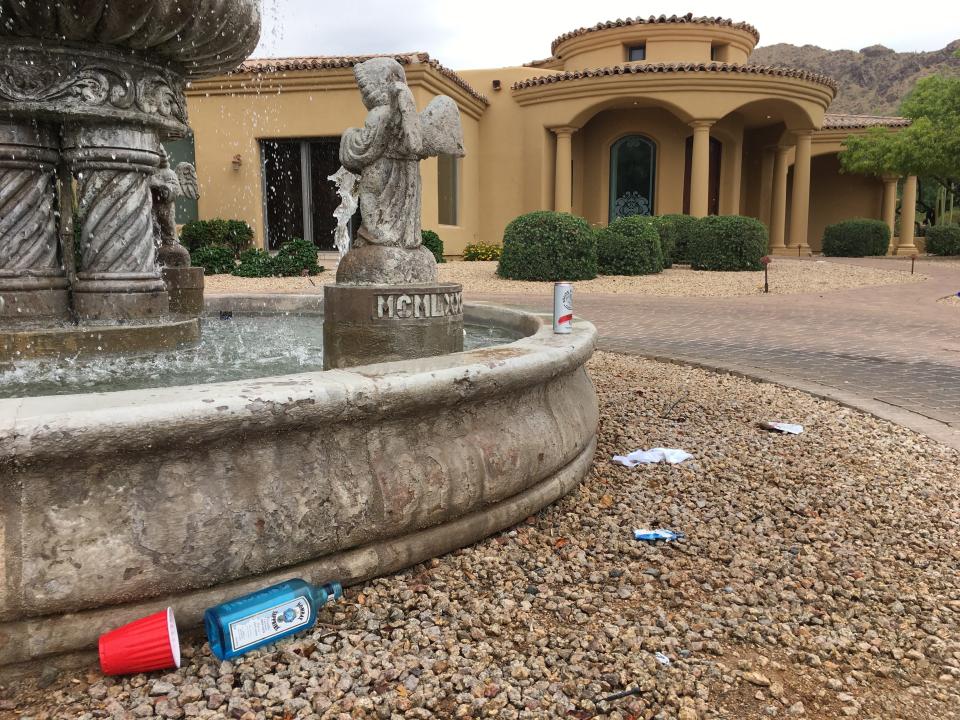Short-term rental reform lobbying ban divides leaders across Arizona

- Oops!Something went wrong.Please try again later.
A lobbying moratorium agreement between short-term rental companies and a statewide group representing municipalities has divided Arizona city and town leaders.
In June, the League of Arizona Cities and Towns signed an agreement with Airbnb and Expedia Group, which owns the vacation rental company Vrbo, that temporarily limits the League's ability to advocate for changes to the state’s short-term rental laws. The League is a membership organization of Arizona's incorporated municipalities and has fought for years for greater municipal power to control short-term vacation rentals.
The agreement, which The Arizona Republic obtained, states that:
For three years, the parties will refrain from trying to change the state law that limits how cities and towns can regulate short-term rentals. That includes SB 1168, the bill signed by Gov. Doug Ducey in early July that allows for more local oversight of the rentals.
For five years, the League will not try to completely repeal SB 1350, the 2016 law prohibiting municipalities from banning short-term rentals, and will not lobby for "legislation concerning changes to add regulatory obligations and burdens on an online lodging marketplace."
The agreement does prevent advocating for statutory changes "related to limiting the proliferation of short-term rentals" in communities, such as density limits or numeric caps.
The agreement was signed on June 24, the same day the Legislature sent SB 1168 to Ducey. The bill restored some power to local governments. It allows cities and towns to require municipal licenses for vacation rentals and enables local governments to crack down on troublesome properties.
Many cities and towns say vacation rentals have caused many problems, from nuisance complaints and safety issues to eating up the local housing supply. In 2016, SB 1350 stripped municipalities’ power to regulate the rentals, spurring years of legislative sparring to get local control back.
The League’s leadership and several League members said signing the agreement was necessary to get SB 1168 passed and that it gives the new law time to work before any of the three parties introduce more changes.
According to Tom Belshe, the League’s executive director, the moratorium was agreed upon by a working group of leaders from 10 jurisdictions: Scottsdale, Sedona, Flagstaff, Goodyear, Lake Havasu City, Fountain Hills, Paradise Valley, Phoenix, Tempe and Chandler.
The agreement only applies to the League of Arizona Cities and Towns, Airbnb and Expedia Group. But while individual cities and towns have the right to pursue short-term rental legislation independently, Belshe said the League could have trouble entering into similar agreements in the future if municipalities don't also abide by it.
“Cities could go off and do their own thing, but again, I don’t think that would be viewed favorably by the other side,” Belshe said.
Some municipalities are not on board.
“We have our own lobbyist, and we will be using our lobbyist, regardless of what the League of Cities and Towns has agreed to,” said Sedona Mayor Scott Jablow, who took office in November. Roughly 16% of Sedona’s housing supply is now vacation rentals, according to the city’s estimates.
What municipal leaders are saying
The Arizona Republic contacted officials from 17 cities and towns about whether they plan to abide by the moratorium. Many said they either intend to abide by it or don’t yet have any legislative plans that would conflict with it. But a few said they will continue pressing for more local control of short-term rentals, despite the agreement.
Paradise Valley Mayor Jerry Bien-Willner, who has been outspoken in the fight for local short-term rental control, said the vacation rental industry would likely have blocked SB 1168 from passing if not for the moratorium.
“Getting 1168 done was an important step forward,” he said. “I don't view a standstill agreement between certain players as a defining moment. I think it’s just one of the realities of the legislative process at the state level.”
Officials from Tempe, Bisbee, Chandler and Fountain Hills said they either don’t have plans to pursue additional short-term rental legislation or intend to see how changes made under SB 1168 satisfy their concerns before deciding on next steps.
“I’m more than happy to see how this plays out over the next couple years myself,” said Bisbee Mayor Ken Budge. “And if we have to go back and say there needs to be more control or more issues that need to be addressed, I think the League would be the one to do it, not one individual city.”
Scottsdale Mayor David Ortega also said the city plans to abide by the moratorium, noting that it does not prevent advocating for legislation limiting the number of short-term rentals.
Officials of other municipalities had different takes.
Lake Havasu City Manager Jess Knudson praised the League’s ongoing work on vacation rentals but said the city is “beholden” to its residents.
“If our residents want additional tools in place or want the city to further address short-term rentals, that’s exactly what we’re going to do,” Knudson said. The city, he said, would like to have more control over the short-term rental application process. Lake Havasu City would also like to require property owners to provide emergency contact information to all nearby homes, not just immediate neighbors, before they begin operating a rental, he said.

Former Payson Mayor Tom Morrissey, whose term ended in December, called the agreement “weak.”
“I know the Airbnbs have a tremendously strong lobby, and I feel the Legislature has been handcuffed in dealing with them,” he said. “But my personal feeling is they’re out of control, and I think they’re counterproductive to the communities they come into.”
Tom Martinelli, Airbnb’s public policy manager, said if municipalities want additional rules, the company would “want to work with them to understand their needs.”
Ashley Hodgini, Expedia Group’s head of U.S. public policy, said the company “remains committed to working with state and local authorities on policies that support homeowners, local communities, and Arizona’s tourism economy.”
Real estate attorney Sean Berens said municipalities that may not want to honor the moratorium must balance whether disregarding the League's position is worth the tradeoff.
"When you disregard those commitments, you are lessening your collective power for the future," he said.
Officials for several municipalities, including Phoenix Mayor Kate Gallego and former Flagstaff Mayor Paul Deasy, whose term ended in December, either did not respond to multiple requests for comment or would not comment on the record about whether or not they planned to abide by the agreement.
‘I’m certainly concerned’: City officials, housing advocates left in the dark
Some city officials, housing advocates and anti-short-term rental activists were surprised to learn of the agreement’s existence and said they are troubled by it.
Phoenix City Councilmember Debra Stark, who represents District 3, said she found out about the agreement from a constituent months after it was signed.
“I’m certainly concerned. I mean, we’ve got an issue of affordable housing in our state. And we need some regulation of short-term rentals,” Stark said. “I don’t think anybody’s opposed to them; it’s just they’ve gotten out of hand.”
Joanna Carr, research and policy director of the Arizona Housing Coalition, agreed. She said that SB 1168 only directly addresses nuisance issues, not the impact short-term rentals have had on the state’s housing supply.
“We’re already at a point where it’s gone too far,” Carr said. “It’s not, 'How can we look at limiting the increase of short-term rental units as of now?' ... It’s that, and, 'How can we claw back what we’ve already lost?'”
Kate Bauer is co-founder of the Arizona Neighborhood Alliance, a group that advocates for short-term rental restrictions. She said the moratorium agreement raises questions about whether groups like hers can trust the League to advocate on communities’ behalf.
“We had heard rumors of a supposed moratorium, but we had also been assured that there had been pushback on that and that it hadn’t happened,” she said.
The silver lining, she said, is that the agreement also sidelines Airbnb and Expedia Group from negotiating any changes to SB 1168, which she believes could make future negotiations easier.
A carveout in the moratorium allows the League to continue advocating for legislation that would enable cities and towns to limit the number of short-term rentals in their jurisdictions.
Berens said that legislation could take several forms, including an amendment to the state statute section that includes both SB 1350 and SB 1168.
The League plans to continue working on legislation that would allow cities to limit the number of rentals, Belshe said, though he knows it will be an uphill battle.
“We haven’t seen an appetite with the Legislature to run something like this,” he said. “So we could run it, but we don’t know if we would get enough votes to have it pass.”
Juliette Rihl covers housing insecurity and homelessness for The Arizona Republic. She can be reached at jrihl@arizonarepublic.com or on Twitter @julietterihl.
Coverage of housing insecurity on azcentral.com and in The Arizona Republic is supported by a grant from the Arizona Community Foundation.
This article originally appeared on Arizona Republic: Arizona short-term rental reform lobbying ban divides leaders
